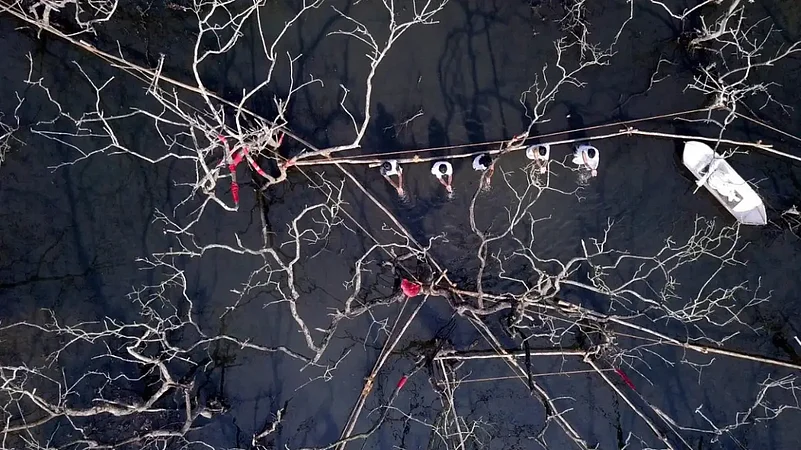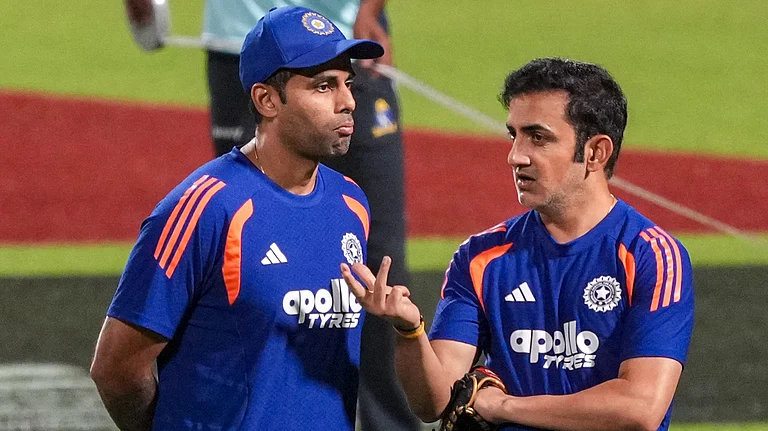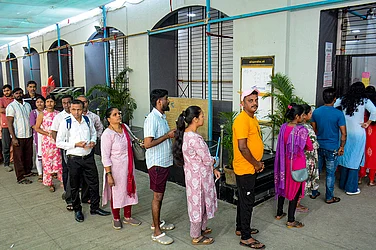The 'sunshine state of India' has seen a gradual yet consistent change, both politically and culturally. But what do the people of Goa think about the shift in the ideological ethos of a state, known not only for its picturesque beaches but also for its unique natural ecosystem and Indo-Portuguese heritage? Outlook Editor Chinki Sinha recently spoke about the magazine’s latest issue on the changing face of Goa in a panel discussion with a journalist, artist, writer, and a hotelier on the past, present, and prospects of the state.
Edited excerpts from the panel discussion that was co-moderated by Goa-based writer and journalist Mayabhushan Nagvenkar:
Goa, a state lying on the west coast of India and known for its scenic beaches, is undoubtedly one of the busiest tourist attractions in the southern part of the country. However, the escalation in tourism, infrastructure development and estranging policymaking are stoking fears that the region is approaching an environmental cataclysm.
The biggest worry that exists is the fact that political machinery, as per activists, works according to the cogwheels of money. In other words, whichever party enjoys a berth in the seat of power, it is money and businesses that often govern the policies and politics at large. As Claude Alphonso Alvares, a renowned environmentalist based in Goa, says, “the system has now become completely oriented to businesses.”
“Politicians,” believes Alvares, “have now become ranked businessmen. Contracts are offered to those who propose more commissions and monetary benefits”.
Goa’s environment and ecology are in flux, and unfortunately, the changes taking place are threatening in myriad aspects. Hence, the initiatives to stop, or at least reduce the drastic transformation of the ecological landscape of the region should be taken urgently.
Alvares believes that the light at the end of the tunnel is faint, but things are changing, even if in a minuscule fashion. Recently, the Goa government barred the mining leaseholders from carrying out any mining-related activity in scores of mining leases whose renewals were cancelled by the Supreme Court of India. And such respite came after the people of Goa put up a long and vehement fight against the state government’s plan for land use.
“Things can change!” says Alvares, while adding that “it was the voice of people that led to the cessation of the vicious town planning activities in Goa, a disaster that had to be and was somehow stopped.”
Although the threat to Goa’s environs has been there since 1970s, the escalation in vicious human activities is picking up a ruthless pace, thereby adding to the challenges lying ahead. Although activism is picking up and peer groups are creating the much-needed pressures, there is much more than what meets the eye. Things fall into place when the political functioning is smooth and accountable.
Frederick Noronha, a senior journalist based in Goa told the Outlook, “Whenever any party in power, and is involved in a foul play which is detrimental to Goa’s environment and ecology, the opposition is nowhere to be seen. The opposition barely keeps the people in power in check.”
The policymaking and the localized activities are threatening Goa, but a bigger menace lies at the doorstep: climate change. The key to tackling the climate crisis, according to Elsa Fernandes, lies in intensive research and studying and finalizing plans of action. Otherwise, she says, the Goa will “drown”.
“What we ought to do, however, we are not,” says Fernandes, who is a Goa-based Environmental Architect, while adding that the people have turned the blind eye to climate change and that the key to solving the problem of the climate crisis is to accept and recognize the climatic concerns.
“After accepting that there is an impending doom waiting, especially at the doorstep of the coastal areas, we need to assess the situations regressively, and technology comes in handy for that,” Fernandes added.
The booming tourism however is not only detrimental to the coastal areas of Goa, the terrains in the hinterlands are experiencing drastic changes as well. The footfall is marching towards the mountainous regions and amid this, the infrastructural development— required to cater the tourism there— needs to be minimal as possible.
“Coastal areas have reached their saturation points long back, and now we should strictly focus on preserving the hinterlands,” said Jack Ajit Sukhija, who is a tourism entrepreneur and a hotelier based in Goa.
In such a case, widespread awareness is the need of the hour, and for this, the publishing industry especially needs a revamp.
“Books published about Goa are often fetishizing the region. Hence, we need more books where touristy clichés are cut down,” said Noronha.
“Vernacular voices, rather than the voices from the metropolitan cities, will prove more educational, and to enhance such voices Goa needs the printing options which are inexpensive” he added.


























